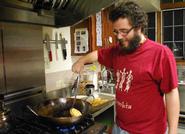
Hamilton students have the choice of a wide variety of living situations. From dark side suites to spacious Carnegie and South quads to Griffin Road apartments, living options are as diverse as the student body. Of all the many housing options offered at Hamilton, probably the least known about is the Woollcott Cooperative (colloquially referred to as the co-op). In high demand among upperclassmen, the co-op option offers a unique Hamilton living and dining experience.
Rather than being able to grab a quick, hassle-free meal at Commons, where food is prepared and dishes are washed out of sight, “co-oppers” take on the extra responsibilities of planning, cooking, and cleaning up dinner for themselves every night in Woollcott’s well-furnished kitchen.
In order to ensure that things are run relatively smoothly, co-oppers operate on a week-by-week schedule, determined during a weekly meeting on Sunday nights. Some chores are delegated on a nightly basis, while others alternate by the week. The idea is that everyone pitches in and cooperates to make sure that the necessary tasks are completed in a timely manner.
Nightly responsibilities are handled by a pre-dinner kitchen tidier, three cooks, two post-dinner dish cleaners, one late night kitchen tidier, and one person to take out the compost. Once a week, two people bake bread, two people bake granola, one person turns the compost, and one person cleans the refrigerator. There is also a weekly “wild card” assignment for one person, such as painting or cleaning the porch. Four people are designated as shoppers, and they alternate off, two per week. Shoppers are authorized by Hamilton to put purchases at stores such as Hannaford and Tom’s Natural Foods on a tab, which is picked up by the college.
Co-oppers plan for meals with environmental sustainability in mind. Vegetables are grown and harvested in the Hamilton College community garden, when in season, and surplus crops are frozen for use later on in the year. Co-oppers make a strong effort to buy locally and organically whenever possible, avoiding meat raised on hormones and choosing to buy from smaller family-owned farms in place of corporate factory farms.
In just its fourth year, the co-op has become a big hit with other students on campus. An email was sent to all Hamilton students inviting the first 40 to reply to a Thanksgiving dinner on Sunday, Nov. 14. Responses poured in so fast that all 40 spots were filled within 45 minutes of the invitation being sent out.
Those lucky enough to live in Woollcott sing the praises of the communal experience. According to Devin Farkas ’10, the co-op provides great experience for students who will soon find themselves in situations where they will be in their own apartments and will have to take on the extra responsibilities of cooking and cleaning for themselves. Farkas thinks of the experience as an experiment in communal living. “Not only do we learn how to cook for ourselves,” he says, ” but we learn the intricacies of living with varying personalities and mediating conflicts.”
As important as the experience garnered from the necessary cooking and cleaning is the sense of community that is fostered by sharing responsibilities and working together. “Living with a bunch of crazy people definitely has its perks- and tasty, ethical and sustainable food is one of them,” says Manique Talaia-Murray ’12, a first time co-op member. “Food is a bond that ties us all and having a common goal makes living in Woollcott seem more like a home than just a dormitory. I’d have to say that my favorite part of living in the co-op is the community.”
